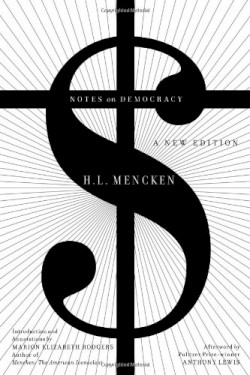Notes on Democracy
H. L. Mencken, one of the greatest American social critics and journalists, would likely say today that we too willingly accept the antics of the poltroons and cads who pass themselves off as our political leaders. That makes this new edition of Mencken’s Notes on Democracy, with an introduction and annotation by Marion Elisabeth Rodgers, and an afterword by Pulitzer Prize-winner Anthony Lewis, as relevant, incisive, and entertaining today as it was when first published in 1926.
Notes on Democracy was first published during the Coolidge administration, soon after the end of World War I, and while the country was both caught in Prohibition’s grip and enjoying the roaring Twenties. The book’s language is colorful and beautifully descriptive; its satire is broad, biting, and caustic; its topic is the brand of democracy practiced in the early twentieth-century United States and the “poltroons and cads” who are its leading practitioners. This is Mencken at the height of his considerable powers holding forth on one of his favorite topics.
Mencken disrobes the sacred in our democratic pantheon. For example, a basic tenet of democratic theory is that all power in a democracy comes from the people. However, Mencken’s “democratic everyman” is marked by his “Â…inability to grasp any issue save the simplest and most banal…in brief, in their congenital incapacity for the elemental duties of citizens in a civilized state.”
And their political leaders fare no better under Mencken’s perceptive eye. He parcels them into two categories: demagogue and demaslave. “The demagogue is one who preaches doctrines he knows to be untrue to men he knows to be idiots. The demaslave is one who listens to what these idiots have to say and then pretends that he believes it himself.”
Democracy, Mencken argues, holds that the average man wants to be free. However, Mencken demonstrates a contrary idea: the average man wants to be safe. He wants the security of the herd. To attain that security the average man will willingly and quickly trade freedom for the promise of security. Thus, politicians constantly play to the fears and hatreds of the common man, whipping him to a frenzy such that he will follow the leader wherever the leader wants to go. The leaders’ reward is power and re-election.
Is Mencken just a cynic who, in actuality, never believed in democracy? Perhaps, but re-read Mencken carefully and compare his criticism to today’s headlines and our current public state of affairs. There is also useful insight and wisdom here. Mencken concludes that democracy did not come from God, thus is not official doctrine. And, if it is not official, then it is up for examination and serious discussion. That sounds very democratic, indeed.
This book will appeal to anyone interested in American English, social criticism, history, and politics.
Review Date: March 2010.
Disclosure: This article is not an endorsement, but a review. The publisher of this book provided free copies of the book and paid a small fee to have their book reviewed by a professional reviewer. Foreword Reviews and Clarion Reviews make no guarantee that the publisher will receive a positive review. Foreword Magazine, Inc. is disclosing this in accordance with the Federal Trade Commission’s 16 CFR, Part 255.

